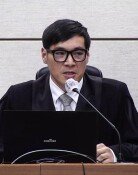Judges must visit illegal rallies to make informed judgment
Judges must visit illegal rallies to make informed judgment
Posted February. 27, 2014 06:46,
Eulji-ro and Namdaemun-ro streets in central Seoul were occupied by illegal demonstrators from the Korea Confederation of Trade Unions (KCTU) on Tuesday afternoon, causing significant inconvenience to citizens who were trapped in buses and taxies for more than an hour on their way home from work. Almost always in the past, protest rallies led by KCTU resulted in illegal strikes, in which demonstrators occupied streets and caused chaotic situation in the city center. Tuesdays rally was staged in the name of the peoples strike committee spearheaded by KCTU as part of all-out offensive through a general strike on February 25, the first anniversary of President Park Geun-hyes inauguration.
The court is also to blame to a significant extent for repeated incidents of demonstrations afflicting pain to citizens in the name of peoples strike. When organizers applied for outdoor rallies that called for march along the city center, the police informed them of ban on marching in line with the Assembly and Protest Act. Later, the organizers submitted a petition for a provisional injunction to the Seoul Administrative Court, and the court said, Ban on marching should be placed on a very limited basis to permit marching.
The court said it also took into consideration the fact that the organizers shortened the duration of assembly and the course for their march, and promised to march through the pedestrian path. However, KCTU is the very organization that caused severe traffic jams last year by illegally occupying streets in the central Seoul, such as the national workers convention (November 10), the convention to cope with national emergency situation (December 7), and the first convention to pledge general strike (December 28). The courts judgment failed to take into account such past violations, which too negligent at best.
Noise pollution was also very serious during rallies. The noise level as measured by police amounted to 88 decibels on average. Office workers around Gwanghwamun district made complaints, saying, We can hardly focus on work. The only measure that police took was to issue the organizers an order banning generation of noise. Generating excessive noise constitutes an act of crime in progress, and if the organizers failed to correct, the authority should have cracked down on immediately. Police recently issued public announcement on a revision bill to executive ordinance designed to toughen noise regulations. The outdated practice of raising the volume of sound at rallies should be corrected without fail.
Whenever illegal strikes are staged in city center, many citizens make compliant, saying, Judges should come out to Gwanghwamun before making judgment. The freedom of assembly is basic constitutional right, but it cannot be allowed if it violates ordinary citizens rights to move and pursue happiness. U.S. police immediately handcuff even senators and congressmen if they violate police line. Police and prosecution as law enforcement authorities should become tougher in dealing with illegal strikes. The court must approach illegal strikes from the perspective of protection of citizens rights, and apply stern legal standards. Advanced countries also make decisions that impose disfavor to organizations that engaged in illegal strikes in the past.






![“설거지해도 그대로”…냄비 ‘무지개 얼룩’ 5분 해결법 [알쓸톡]](https://dimg.donga.com/c/138/175/90/1/wps/NEWS/IMAGE/2026/01/15/133164664.3.png)
